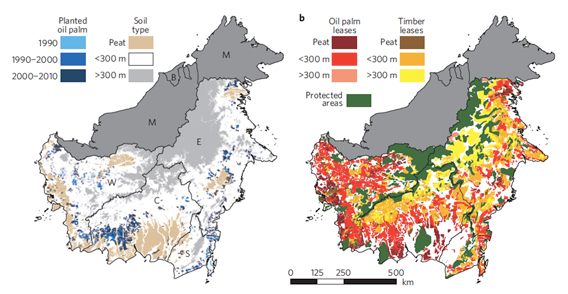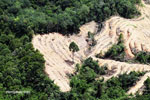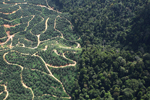
Peatland forest being drained in Kalimantan, Indonesian Borneo. Photo by: Rhett A. Butler.
From 1990 to 2010 almost all palm oil expansion in Kalimantan came at the expense of forest cover, according to the most detailed look yet at the oil palm industry in the Indonesian state, published in Nature: Climate Change. Palm oil plantations now cover 31,640 square kilometers of the state, having expanded nearly 300 percent since 2000. The forest loss led to the emission of 0.41 gigatons of carbon, more than Indonesia’s total industrial emissions produced in a year. Furthermore the scientists warn that if all current leases were converted by 2020, over a third of Kalimantan’s lowland forests outside of protected areas would become plantations and nearly quadruple emissions.
“Carbon emissions solely from oil palm industries may therefore constrain opportunities to meet Indonesia’s pledged 26% reduction below projected 2020 greenhouse gas emissions levels,” the researchers write. Currently, over 75 percent of Indonesia’s emissions are connected to land use change. To help slow its runaway emissions, Indonesia has kick-started a moratorium on forest clearing with a billion dollars in funding from Norway, however the moratorium has been widely critiqued for not being strong enough to slow rampant deforestation.
Delving into unprecedented detail, the researchers calculated that 47 percent of oil palm plantation development from 1990 to 2010 in Kalimantan was at the expense of intact forests, 22 percent at secondary or logged forests, and 21 percent at agroforests, a mix of agricultural land and forests. Only 10 percent of expansion occurred in non-forested areas.

Environmental activists have used orangutans, like these orphans in Kalimantan, as key symbols for preserving Borneo’s forests. However, forests continue to fall. Photo by: Rhett A. Butler. |
“A major breakthrough occurred when we were able to discern not only forests and non-forested lands, but also logged forests, as well as mosaics of rice fields, rubber stands, fruit gardens and mature secondary forests used by smallholder farmers for their livelihoods,” explains Kimberly Carlson, a Yale doctoral student and lead author of the study. “With this information, we were able to develop robust carbon bookkeeping accounts to quantify carbon emissions from oil palm development.”
From 1990-2000 deforestation for plantations resulted in 0.09 gigatons of carbon, but expanding plantations increased that by over 300 percent during the last decade to 0.32 gigatons.
Carlson and her team used satellite imagery and new vegetation classification technology created by Gregory Asner from the Carnegie Institution’s Department of Global Ecology, who appears as a co-author in order to compile just how much forest was lost and carbon emitted.
After crunching the number for 1990-2010, the team then moved onto the future of the palm oil industry and forests in Kalimantan. Gathering oil palm land leases, the scientists found that only 20 percent of current leases had been developed. Unplanted leases still covered 93,844 square kilometers, an area larger than Hungary.
“Leases are awarded without independent assessments of land use and carbon, and are not available for public review,” the authors write. “Carbon emissions from undeveloped leases have therefore remained concealed and excluded from national emission projections.”
The development of all of these hidden leases, many of which remain unknown to locals as well, would result in 1.52 gigatons of carbon released into the atmosphere. Furthermore oil palm plantations would then cover 34 percent of land in Kalimantan outside protected areas, which currently cover about 10 percent.
“These plantation leases are an unprecedented ‘grand-scale experiment’ replacing forests with exotic palm monocultures,” says co-author Lisa M. Curran, a professor of ecological anthropology at Stanford and a senior fellow at the Stanford Woods Institute for the Environment. “We may see tipping points in forest conversion where critical biophysical functions are disrupted, leaving the region increasingly vulnerable to droughts, fires and floods.”
The study finds that protecting peatlands and forests could greatly decrease projected emissions. Protecting peatlands would reduce estimated emissions over the next decade by 37-45 percent, while protecting forests actually decreased emissions from 71-111 percent. Since aging oil palm plantations store some carbon, a gain in carbon is possible if natural forests are protected. Furthermore, the study found that REDD+ programs could be economically competitive with oil palm.
“Under certain market conditions and land management practices,REDD+ initiatives aimed at mitigating these emissions may generate national government revenues similar to oil palm export revenues,” the authors write.
Indonesian President Susilo Bambang Yudhoyono recently announced his “7/26 vision,” targeting seven percent annual economic growth with a 26 percent reduction in emissions from a projected 2020 baseline.
Oil palm plantations aren’t just responsible for greenhouse gas emissions, but have also been linked to dramatically declining biodiversity in the region, since far fewer species thrive in monoculture plantations than natural forest. In addition, the massive expansion of the monoculture has resulted in local conflict as people lose access to forests and agricultural areas.

Planted oil palm, oil palm leases, timber leases and protected areas in Kalimantan. Carlson et al. Click to enlarge.
CITATION: Kimberly M. Carlson, Lisa M. Curran, Gregory P. Asner, Alice McDonald Pittman, Simon N. Trigg and J. Marion Adeney. Carbon emissions from forest conversion by Kalimantan oil palm plantations. Nature Climate Change. 2012.
Related articles
In pictures: Rainforests to palm oil

(07/02/2012) In late May I had the opportunity to fly from Kota Kinabalu in Malaysian Borneo to Imbak Canyon and back. These are some of my photos. Historically Borneo was covered by a range of habitats, including dense tropical rainforests, swampy peatlands, and natural grasslands. But its lowland forests have been aggressively logged for timber and then converted for oil palm plantations.
Roundtable on Sustainable Palm Oil hits 10 year mark
(10/04/2012) The Roundtable on Sustainable Palm Oil (RSPO) is holding its tenth annual meeting later this month. The initiative, which aims to improve the social and environmental performance of palm oil production through a certification standard, has advanced considerably during that time, moving from an idea to a reality: RSPO-certified palm oil now accounts for 12 percent of global palm oil production. Yet the RSPO is not without controversy. Some palm oil companies say its criteria are too costly to adopt and are therefore discriminatory, while environmental critics argue its bar for “sustainable” palm oil is too low and the loopholes allow producers to claim membership even if they aren’t actually producing certified palm oil across all their holdings. Nonetheless the RSPO has support from many of the world’s largest palm oil producers, traders, and consumers as well as the biggest NGOs.
Palm oil company in Cameroon drops bid for eco-certification of controversial plantation
(09/05/2012) Herakles Farm, a U.S.-based agricultural developer, will no longer seek eco-certification of its 70,000-hectare oil palm plantation in Cameroon, reports the Roundtable on Sustainable Palm Oil (RSPO). The move comes amid criticism from environmental groups that Herakles is converting high conservation value rainforest for the plantation.
Aceh revokes permit for controversial oil palm plantation in Sumatra
(10/01/2012) Aceh Governor Zaini Abdullah officially revoked the business permit for a company developing a controversial oil palm plantation in a peat swamp in Sumatra, concluding a case that had tested Indonesia’s commitment to a moratorium on new concessions in peatlands and rainforests.
Palm oil need not come at expense of the environment
(08/16/2012) Palm oil production need not come at the expense of the environment, says Greenpeace in a new campaign that highlights a smallholder approach used by a community in Riau Province on the island of Sumatra.
Campaign cuts Norway’s palm oil consumption 64%
(07/25/2012) A campaign run by environmental activists has helped lead to a 87 percent reduction in palm oil use by eight major food companies in Norway, reports Rainforest Foundation Norway, which led the effort.
Indian palm oil consumption driving deforestation in Indonesia, says Greenpeace
(06/19/2012) Greenpeace opened a new front in its effort to push Indonesia’s palm oil industry to reduce its reliance on forest conversion for oil palm plantations: India, the world’s largest market for palm oil.
Palm oil giant prepares for second-largest IPO of 2012
(06/13/2012) Felda Global Ventures Holdings Bhd. is readying a $3.2 billion public offering to fund expansion of its palm oil business, reports The Wall Street Journal.
Palm oil giant moves forward on zero deforestation initiative

(06/05/2012) One of the world’s largest palm oil companies has become the first to identify and disclose high carbon forests and peatlands in its concessions. Golden Agri-Resources Limited (GAR), the owner of Indonesia’s palm oil giant PT SMART Tbk, on Monday published a carbon assessment of its holdings in Indonesian Borneo. The report is an important milestone under GAR’s forest conservation policy, which prohibits conversion of land with more than 35 tons of carbon per hectare and moves the company toward a zero deforestation target.
Palm oil giant making good on forest commitment in Indonesia, finds independent analysis

(05/29/2012) Palm oil giant PT SMART appears to be honoring its commitment to avoid conversion of high carbon forests in Indonesian Borneo, reports a new assessment published by Greenomics, an Indonesian environmental activist group. The report was issued 15 months after PT SMART — a subsidiary of Singapore-based Golden Agri Resources (GAR) and owned by Indonesia’s Sinarmas Group — signed a landmark agreement with The Forest Trust (TFT) to spare forests and peatlands that have more than 35 tons of carbon per hectare. The deal came after a damaging Greenpeace campaign, which targeted PT SMART for clearing orangutan habitat in Kalimantan and cost the company millions of dollars in contracts.
Palm oil giant to produce 100% segregated, RSPO-certified palm oil
(05/23/2012) 100 percent of New Britain Palm Oil Limited’s palm oil will be eco-certified, segregated, and fully traceable by the end of the year, reports the Roundtable on Sustainable Palm Oil (RSPO).
KFC Australia stops using palm oil
(05/23/2012) Kentucky Fried Chicken (KFC) has stopped using palm oil for fast food sold in its Australian outlets, reports ABC News.







